Why Medication Management Is Crucial for Long-Term Recovery Success

Understanding the Foundation of Medication Management in Addiction Recovery
As addiction recovery journeys begin, managing the precarious balance of medications becomes a cornerstone for sustaining lasting sobriety. Medication management is not merely about adhering to prescriptions but about embracing a comprehensive, individualized strategy that addresses everything from withdrawal symptoms to co-occurring mental health conditions. In this exploration, we'll delve into how effective medication management can enhance treatment outcomes, the benefits of medication-assisted treatment (MAT), and the integral role medications play in preventing relapse and supporting long-term recovery success.
The Importance of Medication Management in Addiction Recovery
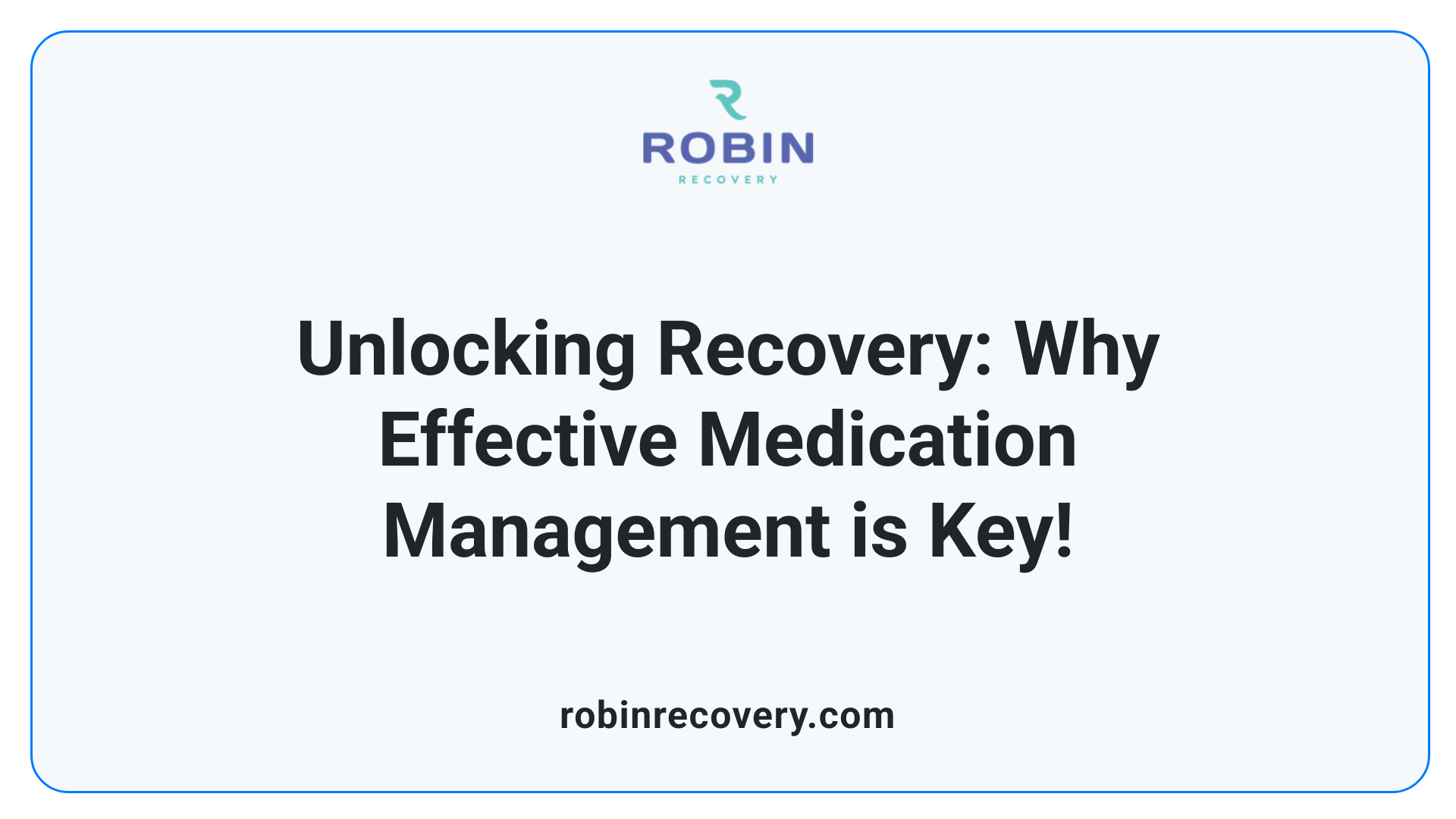
Why is medication management important in addiction recovery?
Medication management is crucial in addiction recovery as it ensures patient adherence to prescribed treatments, effectively alleviating withdrawal symptoms and reducing the risk of relapse. This management involves close monitoring of medication dosages, schedules, and potential interactions, which can prevent serious health complications during recovery.
With a robust medication management system, patients receive education about their medications, enhancing their understanding of treatment plans and compliance. This knowledge is vital for successful recovery and helps lower healthcare costs related to complications arising from non-adherence.
Incorporating technological aids, such as medication reminder apps, can significantly improve adherence by keeping patients engaged and informed. This communication between patients and healthcare providers fosters accountability and ensures adjustments to the treatment plan as needed.
In summary, well-structured medication management is essential for optimizing treatment effectiveness and supporting individuals on their journey to long-term recovery.
Aspect Details Benefits Monitoring Dosages Regular assessments to ensure appropriate drug levels Reduces risk of overdose and withdrawal symptoms Preventing Complications Watch for drug interactions and side effects Keeps patients safe and promotes smoother recovery Education Inform patients about their medications and adherence tips Improves understanding and lowers healthcare costs
Exploring the Benefits of Medication-Assisted Treatment (MAT) for Recovery
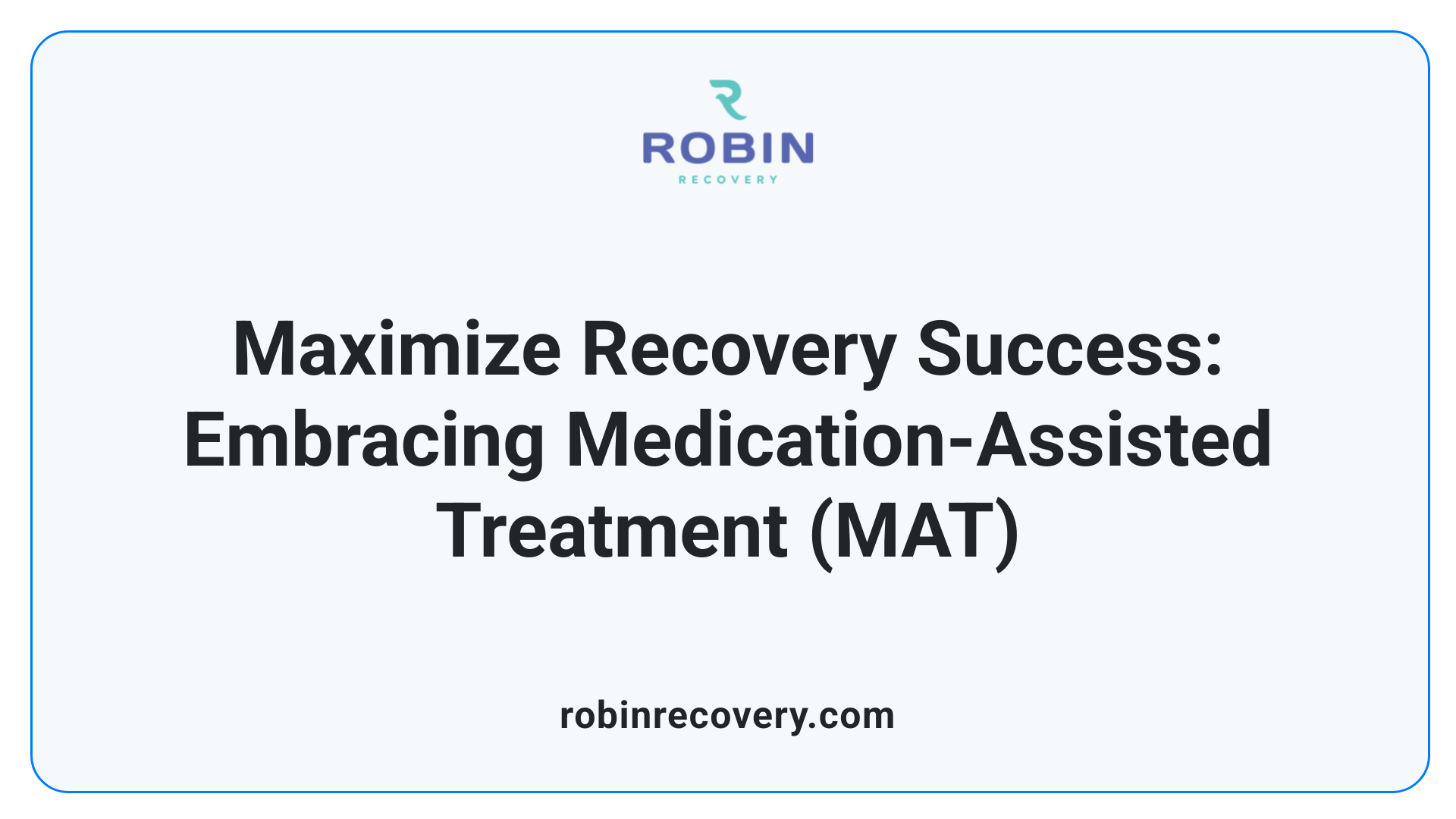
What are the benefits of medication-assisted treatment (MAT) in long-term recovery?
Medication-assisted treatment (MAT) offers several significant benefits for long-term recovery from substance use disorders, particularly opioid and alcohol addictions. It combines FDA-approved medications with behavioral therapies, which helps manage withdrawal symptoms and cravings, leading to better treatment retention and improved outcomes.
MAT has been shown to reduce the risk of relapse and opioid-related overdose deaths, contributing to safer recovery environments. Individuals undergoing MAT often experience enhanced social functioning and a decrease in illicit drug use, which benefit both the individual and public health.
For specific populations, such as pregnant women, MAT can lead to improved maternal and fetal health outcomes. This holistic approach fosters sustainable recovery, addressing not only the addiction but also any co-occurring mental health conditions. Here’s a table summarizing the key benefits of MAT:
Benefit Description Impact on Recovery Withdrawal Management Alleviates withdrawal symptoms during detox Facilitates smoother recovery transitions Cravings Reduction Reduces cravings for substances Lowers relapse rates Improved Treatment Retention Enhances adherence to treatment strategies Leads to more successful outcomes Enhanced Social Functioning Supports better integration into communities Improves overall quality of life Health Outcomes for Specific Populations Benefits for pregnant women and individuals with co-occurring disorders Promotes healthier recovery processes
Enhancing Treatment Outcomes Through Effective Medication Management
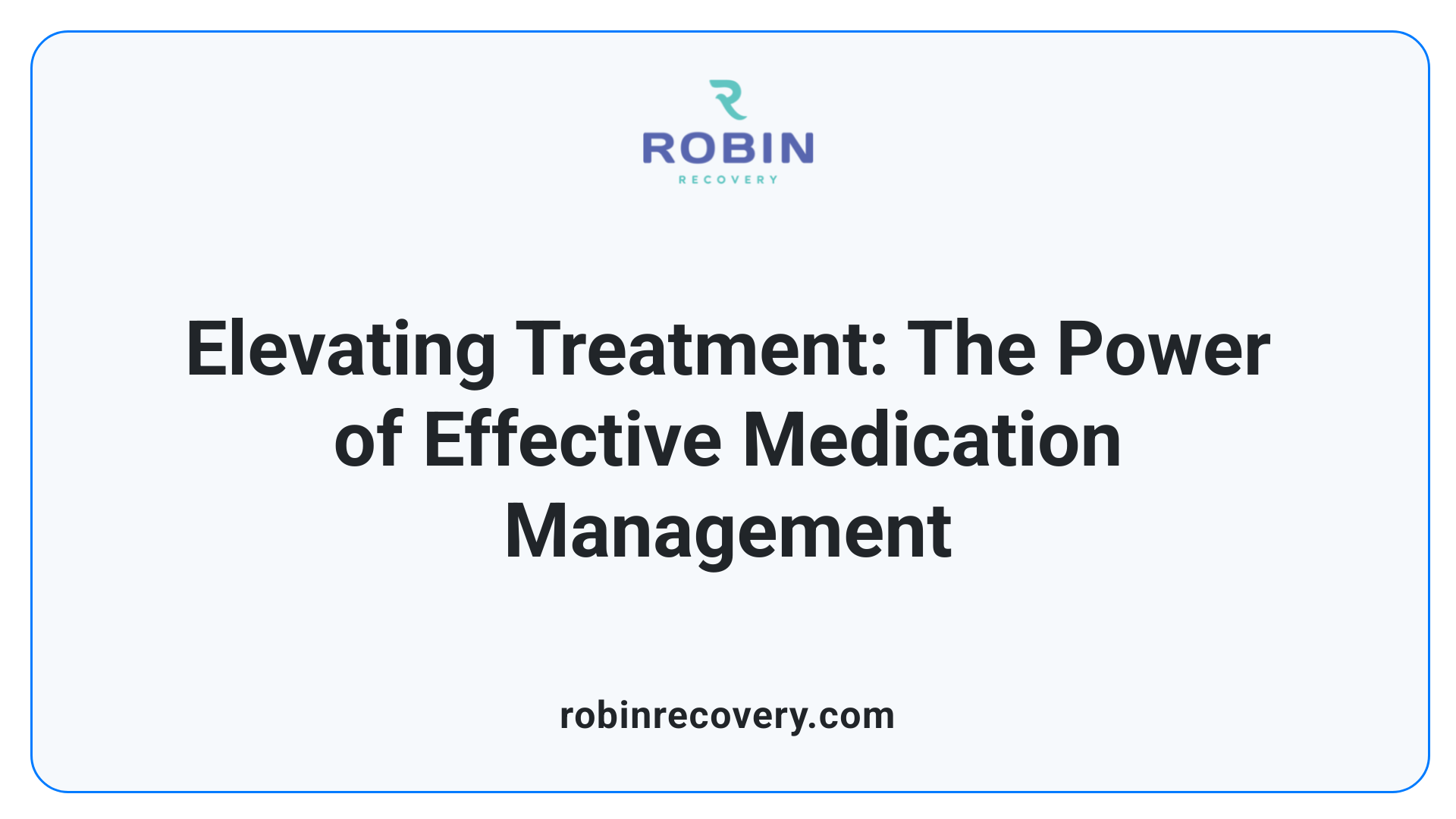
How does effective medication management enhance treatment outcomes?
Effective medication management significantly impacts treatment outcomes by promoting adherence to prescribed regimens. Adherence is vital to maximizing the effectiveness of treatments while minimizing potential adverse drug reactions. Careful selection of appropriate medications is essential, guided by ongoing monitoring of effects to ensure dosages remain safe and effective.
Incorporating patient education is crucial in this process, as informed patients can better engage in their care. This collaborative approach fosters a patient-centered environment that empowers individuals. Regular medication reviews are an integral part of proactive management, helping to identify and rectify any medication errors that could hinder progress.
Key Components of Proactive Medication Management
- Monitoring Effects: Regularly assessing how well medications are working helps tailor treatment plans.
- Feedback Loops: Engaging patients in discussions about their symptoms and experiences leads to timely adjustments in therapy.
- Interprofessional Collaboration: Coordinating care among healthcare providers ensures that all aspects of a patient's history and current condition are considered.
Supporting Patient-Centered Care
Patient-centered care further enhances treatment outcomes through the establishment of personalized medication plans. By addressing individual needs and preferences, providers can create tailored strategies that optimize efficacy and improve quality of life. The result is a healthcare experience that not only alleviates symptoms but also empowers patients to take an active role in their recovery journey.
The Role of Medications in Alleviating Withdrawal Symptoms and Preventing Relapse
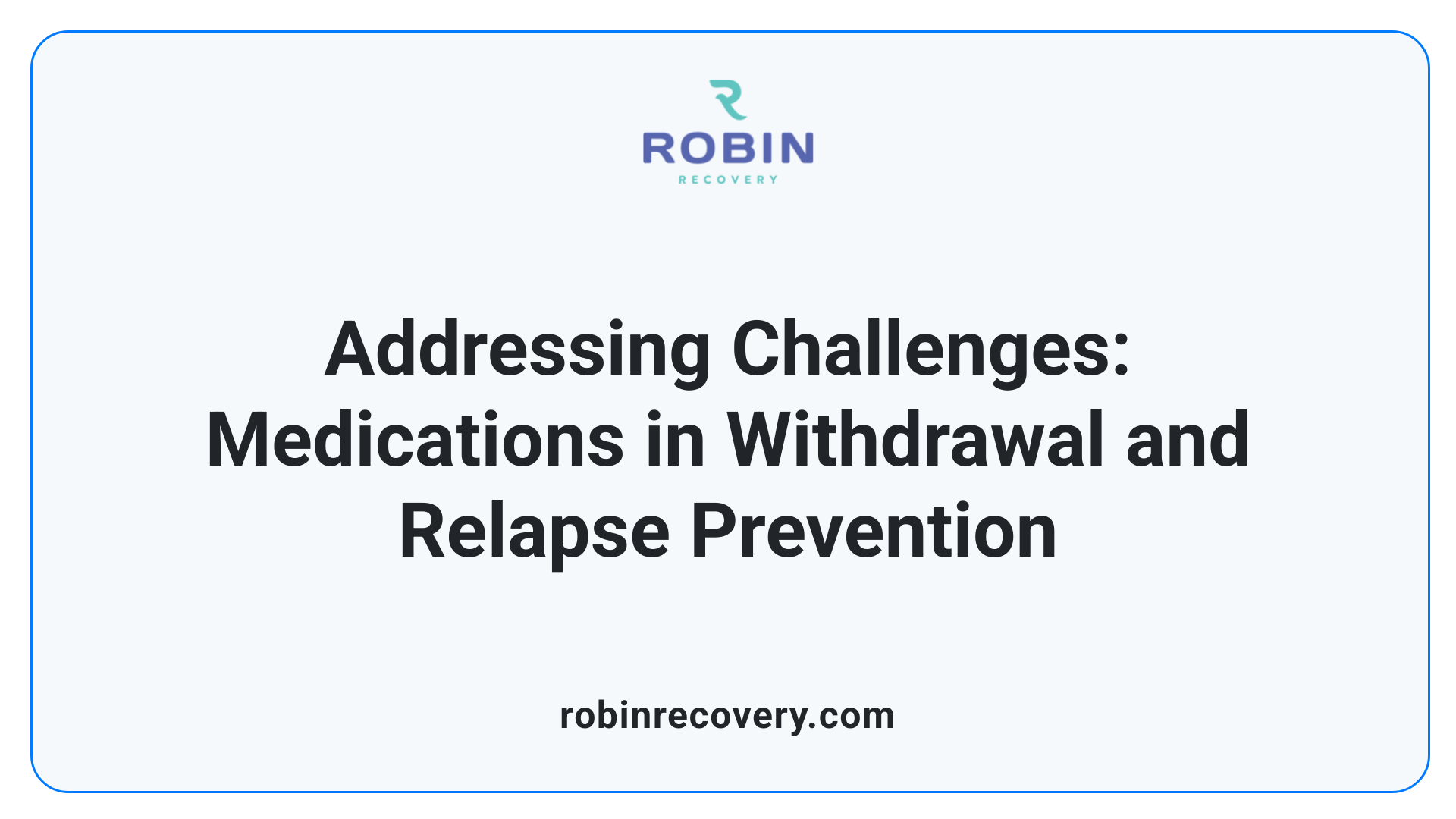
What role do medications play in alleviating withdrawal symptoms and preventing relapse?
Medications serve a crucial function in managing withdrawal symptoms and reducing the risk of relapse throughout the addiction recovery journey. By stabilizing brain chemistry, these pharmacologic therapies alleviate the distress associated with withdrawal and cravings, which are major triggers for relapse.
For alcohol withdrawal, benzodiazepines like diazepam can ease anxiety and prevent complications such as seizures. In opioid addiction, medications like methadone and buprenorphine effectively address withdrawal symptoms and provide long-term maintenance support. Naltrexone, a newer option, helps prevent relapse by blocking the euphoric effects of opioids, making it difficult for individuals to experience the desired high.
In terms of alcohol dependency, disulfiram creates adverse reactions when alcohol is consumed, serving as a deterrent to drinking. Additionally, these pharmacologic therapies are most effective when combined with psychosocial treatments, including counseling and behavioral therapies. The synergy of medication and therapy enhances treatment compliance and ultimately leads to more successful and sustainable recovery outcomes.
Pharmacologic therapies and psychosocial treatments
The integration of pharmacologic therapies with psychosocial treatments represents a holistic approach to addiction recovery. This combined treatment not only addresses the physiological aspects of addiction but also equips individuals with coping strategies and support systems needed for long-term success.
Effective medication management is essential to ensure adherence to treatment plans and avoid potential relapses. As a result, patients are more likely to maintain their recovery status and improve their overall quality of life.
In summary, proper medication management not only alleviates withdrawal symptoms but also lays the groundwork for effective long-term recovery, highlighting the importance of this dual approach in treating substance use disorders.
Navigating Challenges and Risks in Medication Management for Recovery
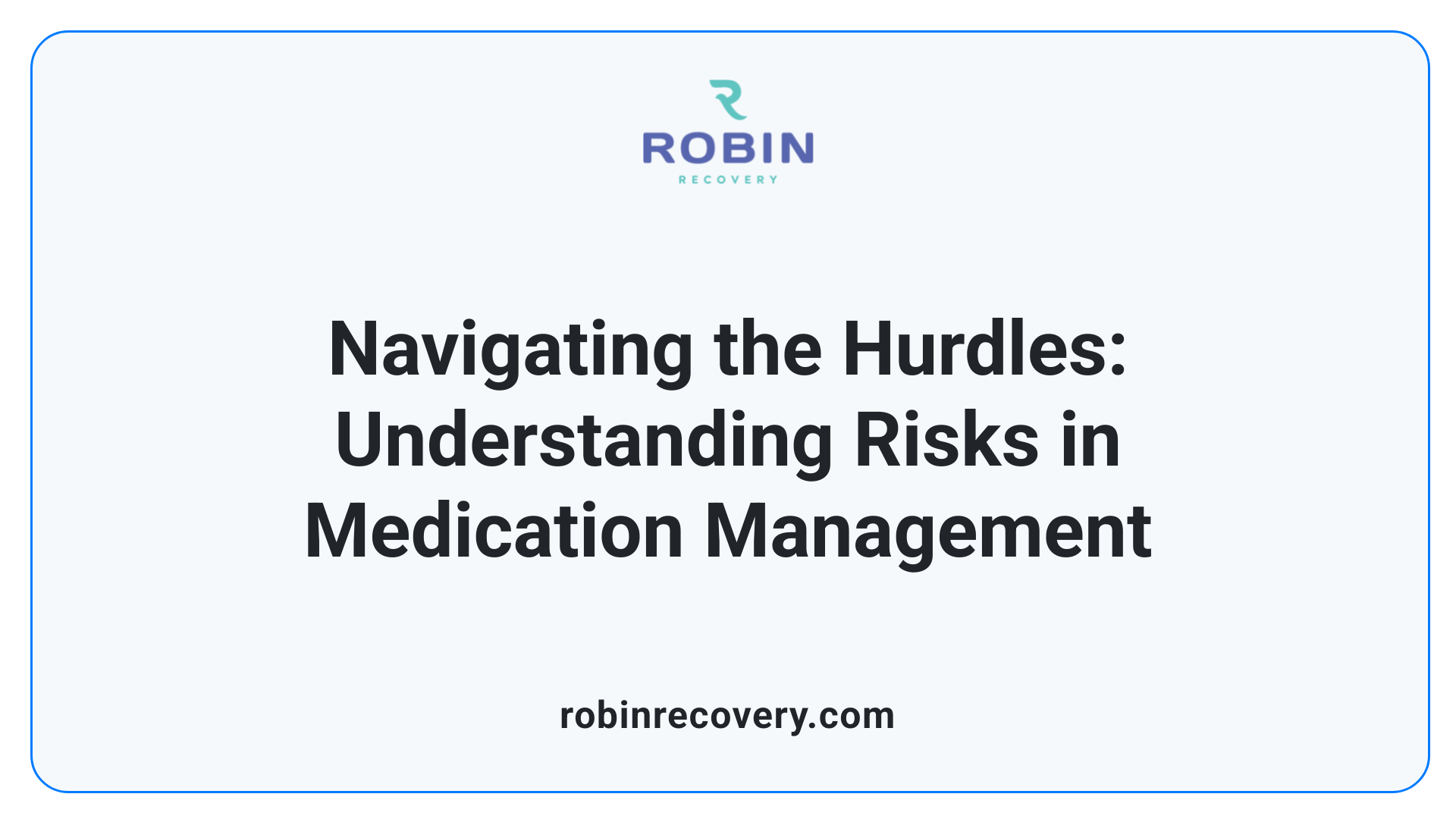
What challenges and risks are associated with poor medication management in recovery?
Poor medication management in the context of recovery poses several major challenges and risks. One of the most pressing issues is incorrect dosing, which can lead to withdrawal symptoms or relapse if a patient misses a dose. This situation is compounded by the possibility of dangerous drug interactions that arise when multiple medications are not monitored closely.
Additionally, medication adherence can suffer due to systemic barriers. In many rural areas, access to medication-assisted treatment (MAT) is limited by restrictive policies and financial constraints, creating a barrier for those seeking help. Stigma around MAT further complicates matters, as misconceptions about treatment affect individuals' willingness to pursue necessary pharmacological interventions.
At the provider level, knowledge gaps may result in the underutilization of effective medications, inhibiting recovery efforts. The intersection of chronic pain management and substance use disorders also complicates the treatment landscape. Thus, a holistic approach that reconciles pain management with addiction treatment is vital to ensuring better outcomes and enhancing adherence to recovery protocols.
Integrating Medication Management with Holistic Approaches in Recovery
Combining Medications with Therapy
Effective addiction treatment employs a multifaceted approach that integrates medication management with counseling and behavioral therapies. This combination is essential for addressing not just the physical symptoms of addiction but also the emotional and psychological challenges faced by individuals on the recovery journey. Medications such as buprenorphine, naltrexone, and acamprosate work to normalize brain chemistry, reduce cravings, and lessen withdrawal symptoms. When paired with therapy, these medications help reinforce coping mechanisms and adherence to treatment regimens.
Tailoring therapeutic interventions to fit the needs of patients enhances the overall effectiveness of treatment. Behavioral strategies may include stress management training and cognitive-behavioral therapy, which can significantly improve patient outcomes when implemented alongside medication. The goal is to create a holistic environment that empowers patients to engage actively in their recovery process.
Patient Engagement and Educational Content
Patient education is a cornerstone of effective medication management. By equipping individuals with knowledge about their medications, potential side effects, and the importance of adherence, providers enhance patient engagement. Utilizing tools such as medication tracking apps and regular check-ins can facilitate open communication, allowing patients to voice concerns and questions without hesitation.
Moreover, having a consistent healthcare provider fosters accountability in managing medications, thereby improving adherence. When patients understand the rationale behind their treatment plan, they are more likely to remain engaged in their recovery.
In summary, integrating comprehensive medication management with holistic therapeutic approaches not only enhances the safety and efficacy of treatment but also fosters a supportive environment that promotes long-term recovery.
The Road Ahead: Commitment to Effective Medication Strategies
Medication management is undeniably crucial for individuals navigating the path to recovery. It involves a comprehensive approach that goes beyond mere prescription adherence—engaging patients and healthcare providers in an ongoing dialogue centered on individualized care plans. As new pharmacological innovations and integrated treatment models continue to evolve, the prospect of sustained recovery becomes steadily more achievable for many. Addressing the root causes of addiction, supporting mental health, and building resilient coping mechanisms remain the guiding pillars of any successful recovery journey. As we look toward the future, ensuring access to effective medication management and support for all individuals overcoming addiction will be integral to cultivating healthier communities and enhancing overall well-being.
References
- 4 Benefits of Medication Management
- Treatment and Recovery | National Institute on Drug Abuse (NIDA)
- Medication Management: A Vital Component of Addiction Recovery
- How Managing Your Medication Will Benefit Addiction Recovery
- Medication-Assisted Treatment and Long-Term Recovery
- What is Psychiatric Medication Management and Why is it Important?
- How Medication Management is Improving Patient Care
